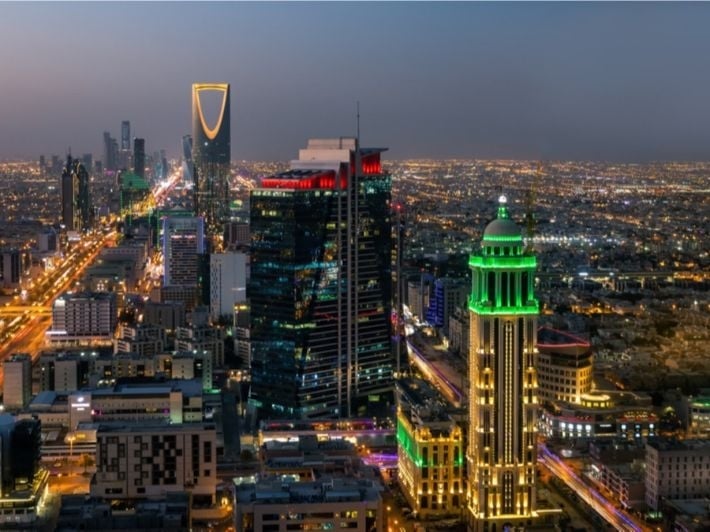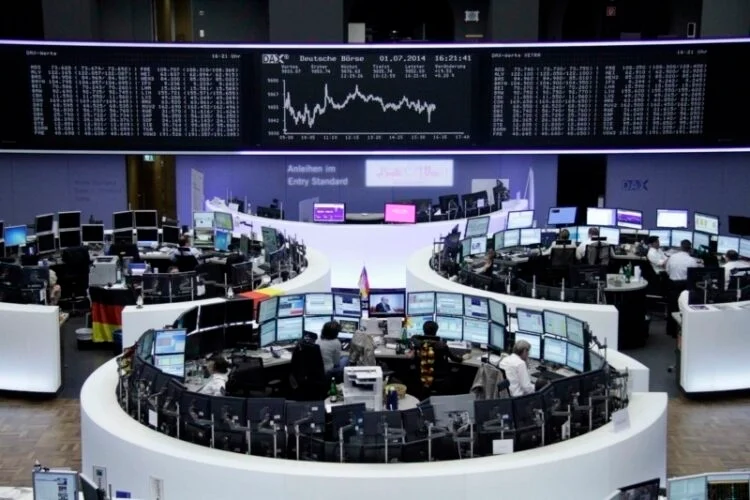Publisher: Maaal International Media Company
License: 465734
The Kingdom attracts 571 international companies to establish regional headquarters, exceeding 2030 target by about 14%
A data analysis obtained by the (LAM Center for Research and Studies) affiliated with (Maaal International Media) from the Ministry of Investment on the Saudi program to attract regional headquarters for international companies (RHQ) confirmed the attractiveness of the Saudi economy and the development of the business environment and legislation to achieve the goals of the Kingdom of Saudi Arabia’s Vision 2030, as well as the efforts made by the Ministry of Investment to enhance the competitiveness of the investment environment in the Kingdom and establish the necessary frameworks for that, which had a positive impact on the increase in the number of companies that established headquarters in the Kingdom by the end of 2024 AD, as the number of companies by the end of 2024 AD exceeded the 2030 target by 14.2%, according to the data, the number of international companies that obtained licenses to open their regional headquarters in the Kingdom until the end of last year 2024 AD amounted to 571 companies, including 39 different nationalities and located in 15 sectors, thus exceeding the 2030 target, which 500 companies.
Consecutive leaps and new horizons
Data from the Ministry of Investment shows an increase in the number of global companies attracted by Saudi Arabia to establish headquarters, jumping in 2023 to 280 companies, an increase of 199 companies and a rate of 246%. In 2024, the number continued to rise to double to 571 companies, an increase of 291 companies and a rate of more than 100%. Thus, the number has doubled in the last three years to 6 times, a jump of 600%. This is at a time when ambitions and new horizons are increasing to achieve greater leaps after the Kingdom won the organization of the 2034 FIFA World Cup and “Expo 2030”.
اقرأ المزيد
The number of global companies that have adopted the Kingdom of Saudi Arabia as their regional headquarters reaching 571 companies confirms the great success of the program that was established in 2021. The program offers a range of incentives, including incentives to attract global talent, tax incentives, and other incentives.
The number of regional headquarters for global companies exceeded the 2030 target by 14.2% by the end of 2024, 6 years ahead of schedule, reflecting the attractiveness of the Saudi market for global companies. Since the launch of Saudi Vision 2030, the Kingdom of Saudi Arabia has become the focus of global companies, as the vision’s programs and policies have drawn a promising future for the Saudi market in all fields, and led the largest and fastest development and change process witnessed by societies in modern history.
The capital, Riyadh, is at the forefront
According to data from the Ministry of Investment, the Saudi capital, Riyadh, has acquired nearly 90% of the regional headquarters of companies, as major companies in the world prefer its proximity to decision-makers to open their main headquarters. This does not mean that the work of these headquarters is limited to the capital only, but these companies often open affiliated offices in different regions of the country, and in the case of the Kingdom, with the expansion of its area and the balanced development pursued by the vision programs, all Saudi regions have become targeted by international companies. The Western Region, represented by the cities of Jeddah and Yanbu, has acquired 5% of the regional headquarters of international companies operating in the Kingdom, i.e. about 30 international companies, in light of the major projects currently witnessed by the Western Region such as the Red Sea Project, the Jeddah Central Development Project, Amaala, and other development projects distributed throughout the region. It is expected that the Western Region will witness more attraction of regional headquarters of international companies in sectors such as logistics and distribution to reach global markets through their regional headquarters and investments in the Kingdom. The Eastern Province of the Kingdom, represented by Dammam, Khobar, Dhahran and Jubail, also acquired 5% of the regional headquarters of international companies, as the Eastern Province represents one of the largest development arms in Saudi Arabia in light of its concentration of petroleum, petrochemical and mineral projects, and its great importance to the global economy.
It is expected that the Eastern Province will witness more attraction of regional headquarters for international companies in sectors such as oil, gas, petrochemicals and heavy industries through its presence on the coast of the Arabian Gulf, which represents one of the largest arteries of oil supplies in the world. Saudi foreign policy enjoys balance, which in turn was reflected in the diversity of nationalities of companies that chose the Kingdom as their regional headquarters. Saudi Arabia’s strong, solid and stable relations with various global poles were greatly reflected in the diversity of international companies that responded to the program and chose the Kingdom of Saudi Arabia as their regional launch center. 30% of global companies in professional services
Data from the Ministry of Investment show that the global companies attracted to date are distributed across 15 sectors, 30% of which operate in the professional services sector (consulting and others), i.e. 170 companies out of the total number of companies. As this constitutes a strategic importance in the stage of establishment, construction and development witnessed by the Saudi economy, the Kingdom of Saudi Arabia is witnessing a rapid movement in its attraction of the best global competencies and international consultants to benefit from their expertise in the Kingdom and at the regional level.
CIT sector stands out
In second place came companies operating in the communications and information technology sector with 19%, or about 109 global companies. The communications and information technology sector is one of the most prominent sectors in which the Kingdom of Saudi Arabia is distinguished, achieving a very advanced global ranking, one example of which is its competition for the top six places globally in global standards for internet service speeds.
Recently, the Kingdom of Saudi Arabia jumped 25 places in the United Nations E-Government Development Index in 2024, to be among the group of leading countries in the world in this field. It also achieved fourth place globally, first regionally and second among the G20 countries in the digital services index, in addition to achieving seventh place in the e-participation index. The city of Riyadh also achieved third place out of 193 cities around the world in this sector.
Thus, the Saudi communications and information technology market has become a major target for global companies operating in the sector, in light of the presence of a strong communications infrastructure that has enabled the Kingdom to rise to advanced international ranks. The future is promising in light of the great pace of digital transformation and the unlimited ambitions of the Saudi leadership, which primarily aims to continuously improve the services provided to local and international companies, citizens, residents and visitors, which has been greatly reflected in the Kingdom’s attractiveness to quality investments and global competencies.
In third place came the health sector, with a percentage of up to 17% of the companies attracted, with about 100 companies, as the health sector in the Kingdom is witnessing a significant development in the services provided. The Saudi health insurance system has become a model to be emulated globally, especially after the continuous development witnessed by government hospitals and health centers and the great expansion of the private sector in this field, which has made international companies currently competing to work in the Saudi market in the health sector, as some companies have begun to open factories to manufacture medical devices, medical equipment and medicines in the Kingdom.
Program Features and Targets
The strategic direction of the program supports the directions of international companies in expanding their investments in the region by establishing their regional headquarters in the Kingdom of Saudi Arabia, and the ongoing efforts to implement and complete the various stages of the proposed major projects, as well as efforts to localize technology.
This trend also supports the Kingdom’s vision to enhance foreign direct investment to reach 5.7% of GDP, and to raise foreign direct investment flows to about 388 billion riyals annually, which enhances many sectors such as tourism, retail, real estate, and the establishment of international schools for the children of resident employees working in global companies. It is worth noting that foreign direct investment flows as a percentage of GDP in 2023 amounted to about 2.4%, achieving the target of the National Investment Strategy for the same year, and foreign direct investment flows witnessed a 50% increase in 2023 compared to 2022 (after excluding the exceptional Aramco deal, which amounted to about 55 billion riyals), to record 96 billion riyals, exceeding the target of the National Investment Strategy for the same year of 83 billion riyals by 16%. On the other hand, the total nominal fixed capital formation amounted to about 1,117 billion riyals in 2023, recording a growth of 9%, driven by the growth of the non-governmental (private) sector by 10%, as the private sector constitutes 86% of the total fixed capital formation, exceeding the target of the National Investment Strategy for 2023 by 32%.
The economic impact of the strategic direction of the program also includes ensuring that the main products and services purchased by various government agencies will also be implemented in the Kingdom, with appropriate local content, which enhances competitiveness and transforms the Kingdom into a global business center and a destination for international economic entities.
This direction will contribute to supporting the provision of opportunities for exchanging experiences and transferring knowledge to Saudi competencies by attracting the best global competencies and expertise to work with the sons and daughters of the nation, and acquiring more skills, experiences, training, knowledge transfer, and enhancing the competitiveness of the experiences of the sons and daughters of the nation at the regional and global levels, which supports the attractiveness of the Kingdom’s investment environment at the international level.
After the announcement of the Kingdom’s winning bid to host Expo 2030, the Asian Winter Games in 2029, and recently the 2034 FIFA World Cup, it is expected that the pace of attracting companies to the Kingdom will increase, as they welcome more international companies to participate in planning and implementing these events and mega projects in various sectors. There will be huge opportunities for promising contracts and investments, creating thousands of investment opportunities and job opportunities for the sons and daughters of the nation. The opportunities to attract international companies vary across many sectors, most notably the tourism and entertainment sectors, organizational services such as reservations and events, as well as professional services such as consulting, financial services, and others. In addition to transportation and work services such as providing temporary offices and accommodation for foreign work crews, as well as services to facilitate the recruitment of domestic workers, contractors, maintenance workers, and other investment opportunities.
It is worth noting that the “Saudi Program for Attracting Regional Headquarters of Global Companies” coordinates with several government agencies in the Kingdom of Saudi Arabia to provide distinguished benefits, support services and incentives to these companies. These include tax incentives, incentives to attract global talent and other services provided through the “Meeza Program” by the Ministry of Investment to attract executives and distinguished talents to work in these regional headquarters. These incentives are granted from the date of issuance of the regional headquarters license with the aim of attracting and providing support to accelerate the procedures for global companies to open their regional headquarters in the Kingdom of Saudi Arabia, and making the Kingdom the first and best choice for these companies in the Middle East and Africa region.








